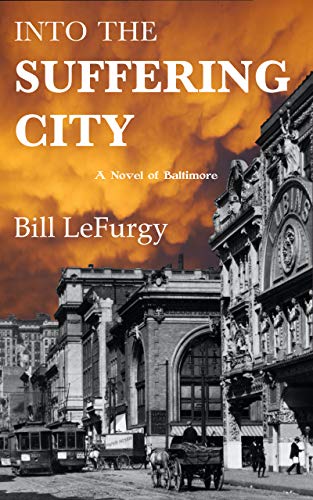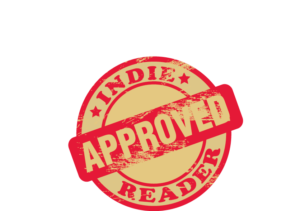Into the Suffering City: A Novel of Baltimore received a 4+ star review, making it an IndieReader Approved title.
Following find an interview with author Bill Lefurgy.
What is the name of the book and when was it published?
The book’s name is “Into the Suffering City: A Novel of Baltimore;” the official publication date is April 15, 2020.
What’s the book’s first line?
“Dr. Sarah Kennecott scanned the dead girl’s naked body.”
What’s the book about? Give us the “pitch”.
A courageous young female doctor and a tormented private eye enter the seedy underworld of 1909 Baltimore in search of a killer. The city is jumping with danger and excitement with new thrills like cocaine and moving pictures. Old troubles still thrive, including vice, corruption, and the pain of brazen racism and sexism. Dr. Sarah Kennecott is on the autism spectrum—a trait unidentified at the time. Her passion is justice for murder victims, and after getting fired for looking too closely into the killing of a showgirl, she refuses to back down. Sarah forms an unlikely bond with Jack Harden, a down-on-his-luck private detective. The clues lead into Baltimore’s dark criminal world that hides a stunning pair of secrets, each of which is worth killing to keep. As Sarah and Jack move between gritty dives and grand mansions, the story reveals the contrasts of a city straddling the border of north and south and at the crossroads of the past and future.
What inspired you to write the book? A particular person? An event?
The book is inspired by two major elements of my life. First was my work as a historian, including serving as the Baltimore City Archivist early in my career. I ran across lots of eye-popping stories and kept telling myself “someone needs to write a novel about this stuff.” So I did! The second event was the birth of my first child, who is autistic. His experience in the world is unique, and I thought it would be fascinating to apply a perspective like that to a fictional character. We hear quite a bit these days about autism but it isn’t dealt with all that much in fiction.
What’s the main reason someone should really read this book?
This is an immersive story with characters you care about and root for as they overcome all kinds of difficulties. The book is also a twisty mystery that keeps the reader guessing until the end. You also learn about life 100 years ago when things we take for granted now were just appearing—cars, electricity, child labor laws, and the campaign for women’s rights.
What’s the most distinctive thing about the main character? Who-real or fictional-would you say the character reminds you of?
Sarah Kennecott has two distinctions. She’s a brilliant female doctor at a time when women were regarded as second-class citizens–they couldn’t vote or go into restaurants unescorted. And she’s on the autism spectrum at a time when nobody had a clue what “on the spectrum” meant. The fictional character that’s most like her is Saga Norén, the female detective in the Swedish TV drama “The Bridge.” Sarah is more ladylike than Saga, but just as fierce. For Jack Harden, his most distinctive traits are his decency and empathy for others. He’s a far better man than his time, which is remarkable given his own struggles in life. He reminds me of Will Kane, the resolute Gary Cooper character in “High Noon.” Jack’s got a sense of humor and is a better judge of people, but both characters are brave, modest, and honorable.
If they made your book into a movie, who would you like to see play the main character(s)?
My top choice for Sarah would be Charlotte Riley, a British actress who was most recently in “Press” on PBS Masterpiece. She’s small, dark, and intense. Brie Larson or Saoirse Ronan would also be great. For Jack I see Chris Hemsworth or maybe Tom Hiddleston.
When did you first decide to become an author?
I took a test in fifth grade career day and the result said I should be a writer of some kind. That inspired me to explore all kinds of books. As a young teenager I read authors such as Phillip Roth, James Baldwin, Norman Mailer, George Orwell, and Evelyn Waugh; much of the substance went over my head, but I got hooked on sharp, lucid prose. I went on to a career that featured a great deal of non-fiction writing, but I always wanted to write fiction.
Is this the first book you’ve written?
My first novel—yes.
What do you do for work when you’re not writing?
I am thankfully retired, although I spend at least 20 hours a week looking after twin 21-month grandkids. Their favorite read is currently “Animal Sounds,” a 10-page board book. It’s a wonderful life.
How much time do you generally spend on your writing?
At least four hours a day, often more, staying up deep into the night. So much of it is rewriting (and rewriting again). I’m obsessive about using the right words in the best possible way, and every time I read a draft I see something to change. It can get pretty exhausting, truth be told—I’m incredibly lucky to have a fantastically supportive wife who puts up with a lot.
What’s the best and the hardest part of being an indie?
Understanding just how good (or bad) your work is. I always dreamed of having a Maxwell Perkins kind of editor who would put the stamp of approval on my writing (and, where necessary, a stamp of disapproval). As an indie, you’re on your own. You can get feedback—you MUST get feedback—but there’s no source on high to guide you. After a long period of struggle and self-doubt, you do get better at knowing what works and what doesn’t.
What’s a great piece of advice that you can share with fellow indie authors?
Find a way to get honest feedback. Bear in mind that beyond spelling and grammar, critiquing a book in a useful way is very difficult. It’s a special skill that’s worth paying for. Knowledgeable critiques are invaluable, even if disheartening initially. The key is to have as many eyes as possible on the manuscript to point out strengths and weaknesses. Any writer can easily convince themselves that their pages are really good—but they never start out that way (unless you’re a rare talent like John Updike).
Would you go traditional if a publisher came calling? If so, why?
The publishing world is a mess with lots of dissatisfied people; one agent told me that she and many of her peers “just aren’t making any money right now.” Even established authors get little help with marketing and live in fear of getting dropped if their sales fall below certain benchmarks. Agents and editors are chasing after the next blockbuster and there is a smaller chance than ever that an unknown writer can break through. But I’m like most indies, I suppose; if the right deal came along I’d consider it strong with eyes wide open.
Is there something in particular that motivates you (fame? fortune?)
My main motivation is to produce the best story I possibly can. Of course, I’d be happy with fame, fortune (or both!) but I sure don’t expect it.
Which writer, living or dead, do you most admire?
I’d say Dashiell Hammett for his seminal detective fiction, especially the “hard boiled” school. Anyone writing American (maybe any nationality) detective fiction is influenced by the man. Another writer I admire is Flannery O’Conner, who has a marvelous cast of funny/quirky/unique characters. While some of them might seem too grotesque to be real, there is an illuminating streak of humanity in them all.
Which book do you wish you could have written?
While I would love on some level to have penned “The Maltese Falcon,” or “The Big Sleep,” I can honestly say I’m completely happy to have written “Into the Suffering City”—it’s my best effort (so far) and it’s all mine.

